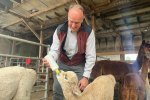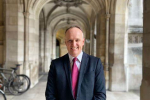Dr Neil Hudson MP – an experienced equine veterinary surgeon, and the only vet in the House of Commons – lent his expertise to a debate on the future of horseracing in the UK.
The veterinary MP firmly believes the future of the sport is strong, and highlighted several animal welfare improvements ongoing in the industry, such as changes to the Grand National so horses take initial jumps at slower speeds and the race is less crowded, changes to whipping rules and wider welfare support for retired racehorses.
Dr Hudson argued that these reforms are critical to maintaining the social licence between the industry and the public. For instance, greater concern for animal welfare promotes greater social acceptance and allows the sector to thrive.
On the relationship with betting revenue, Dr Hudson said he will push to make sure funds continue to be put back into the sport in terms of improving racing and breeding and also the advancement of veterinary science and research.
Dr Hudson brought with him to the debate his professional experience in the field. Dr Hudson is a veterinary surgeon, an RCVS Diplomate in Equine Internal Medicine, a fellow of the Royal College of Veterinary Surgeons, a member of the British Equine Veterinary Association, was a member of the British Horseracing Authority’s whip consultation steering group and is a part of the BHA-convened horse in society group.
Speaking afterwards, Dr Hudson added:
I was delighted and honoured as a veterinary surgeon and MP to be able to stand up in the Commons and speak in strong support of the great industry that is UK horseracing. I believe the future is strong for the sector, and we need to continue to support the amazing people and the horses that are so pivotal. It is so important for horseracing to have that contract with the public and the public consent for that great sport to continue.
“Horseracing is the second largest watched sport in the UK, providing £4.1 billion to the UK economy and employing 20,000 people here directly. It is imperative not just to our sport, but our nation, that we seek to continue to improve equine health and welfare and keep horseracing resilient for future generations to enjoy.”





